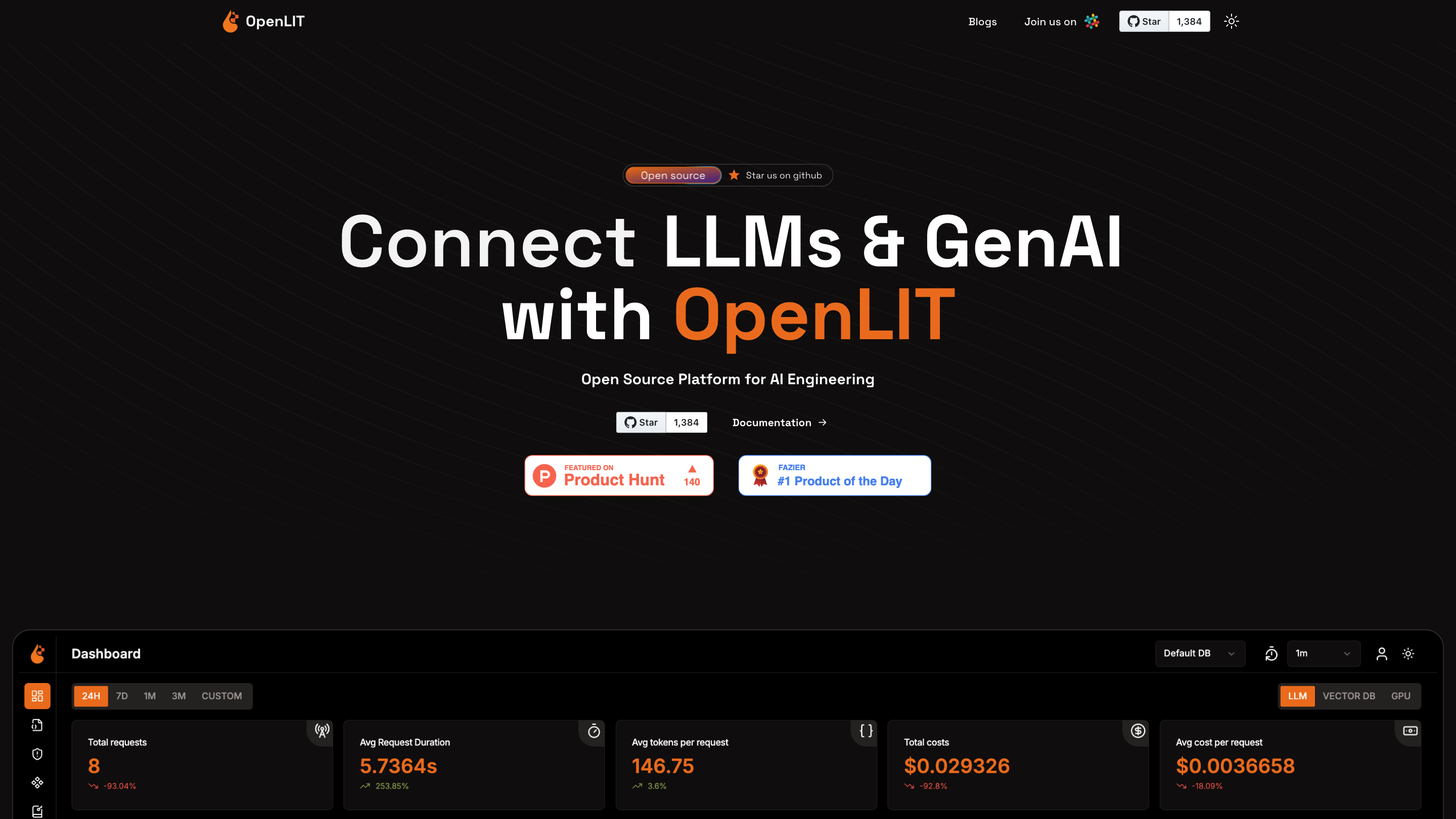OpenLIT
Open siteResearch & Data Analysis
Introduction
Open-source GenAI and LLM observability platform
OpenLIT Product Information
<# OpenLIT: OpenTelemetry-native GenAI and LLM Application Observability #>
OpenLIT is an open-source observability platform designed for GenAI and LLM applications. It helps you understand, monitor, and optimize AI-powered workloads by providing end-to-end tracing, exception monitoring, cost analysis, prompt management, secret management, and seamless integration with OpenTelemetry. It supports running locally (docker-compose) and can be hosted yourself, offering transparency into what your code does and how it performs across different providers and models.
What OpenLIT Provides
- End-to-end tracing of requests across different providers to improve performance visibility
- Detailed span tracking for response time and efficiency
- OpenTelemetry-native instrumentation for AI apps
- Cost tracking and detailed reporting to aid budgeting and decision-making
- Automatic exception monitoring and detailed stack traces to diagnose issues
- Integration with Traces to capture exceptions within request flows
- A playground to compare LLMs side-by-side on performance, cost, and metrics
- Centralized prompt repository with versioning and dynamic variables
- Secrets management (Vault Hub) with secure storage, access, and environment integration
- Easy-to-use SDK integrations for Python and TypeScript
- Real-time data streaming for quick visualization and decision making
- Observability platform integrations (Datadog, Grafana Cloud, etc.)
- Open source: easy onboarding with docker-compose and self-hosting capabilities
How to Use OpenLIT
- Run locally with Docker:
- docker-compose up -d
- Initialize the OpenLIT client in your project:
- Add openlit.init() to start collecting data from your LLM application
- Instrument your code to emit traces, metrics, and logs via OpenTelemetry-compatible mechanisms
- Explore:
- Side-by-side LLM comparisons in OpenLIT PlayGround
- Cost analysis dashboards and detailed reports
- Centralized prompts and secrets management
- Connect to your favorite observability tools (Datadog, Grafana Cloud) for export and visualization
Core Features
- End-to-end tracing of requests across LLM providers via OpenTelemetry
- Detailed span tracking for performance and efficiency analysis
- Automatic exception monitoring with detailed stack traces
- Side-by-side LLM comparison in PlayGround (performance, cost, metrics)
- Centralized prompt repository with versioning and dynamic variable substitution
- Secrets management via Vault Hub with secure storage and environment integration
- Environment-aware secret access and secure key management
- Real-time data streaming for immediate visibility into AI workloads
- OpenTelemetry-native integration for seamless instrumentation
- Cost analysis and comprehensive reporting for budget optimization
- Easy onboarding: self-hosted solution with docker-compose
- Observability platform integrations for export to Datadog, Grafana Cloud, etc.
How It Works
- Instrument your LLM applications with OpenTelemetry and OpenLIT SDKs (Python/TypeScript)
- Collect traces, metrics, logs, and secrets to obtain full observability across models, prompts, and calls
- Use the PlayGround to compare models on real-time performance and cost
- Store prompts and secrets securely; substitute variables at runtime
- Export data to your preferred observability stack for dashboards and alerts
Safety and Privacy
- OpenLIT is an open-source tool designed for transparency; ensure you do not log sensitive data in traces or prompts
- Use Vault Hub and secure environment handling to protect credentials and API keys
- Follow best practices for data minimization and access controls when instrumenting your applications
Getting Started Quick Reference
- Start locally: docker-compose up -d
- Initialize: openlit.init() in your app
- Instrument: add tracing and metrics via OpenLIT/OpenTelemetry
- Analyze: use PlayGround and cost reports to optimize
- Secure: manage secrets with Vault Hub and environment variables
Target Audience
- AI engineers and MLOps teams building GenAI/LLM-powered apps
- Teams needing end-to-end observability, cost control, and reliability for AI workloads
- Open-source enthusiasts seeking a transparent, self-hosted observability solution
